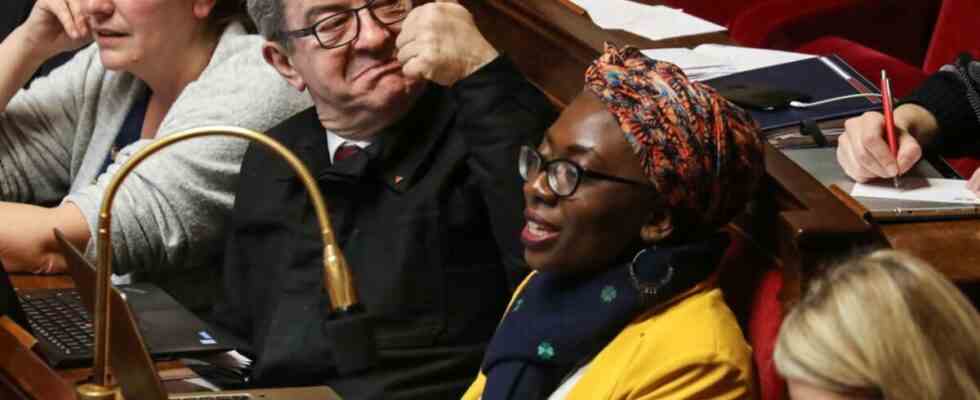The day after the first round of the presidential election, some newspapers announced that Jean-Luc Mélenchon was going to take over, in the fall, the direction of a foundation close to La France insoumise. A kind of pre-retirement, in short. But on Tuesday evening, the ambitions were clearly different when, on BFMTV, the MP for Marseille asked the French to “elect Prime Minister” during the legislative elections next June. Nothing less. With 22% of Jean-Luc Mélenchon on April 10, the rebellious coordinator, the deputy Adrien Quatennens, had already said he wanted to “impose cohabitation” on the president or the president who will be elected on Sunday. The case has now changed in dimension.
Even if it missed the second round, the left bloc emerged from the first round of the presidential election in better health than in 2017: its candidates won nearly 32% of the vote, against 27.5% in 2017. This score, more or less equal to that of the far right (depending on whether Nicolas Dupont-Aignan is added to it or not), can, indeed, allow it to nurture some hopes for the legislative elections. In about a hundred constituencies, the total number of votes on the left exceeds 40% and, in about forty of them, this total even exceeds 50%. Far from an absolute majority (289 seats) but perhaps enough to exceed the 60 seats held today by the Socialists, Communists and rebels in the Assembly – or even become the main opposition in the event of a broad union which would allow – at least – to the left of being in the second round in many constituencies.
Union conditions
It’s all on paper. “I want to send a strong message: no settling of accounts, no resentment, no acrimony. We have to come together, ”said Jean-Luc Mélenchon on Tuesday. Nothing to do with 2017, where LFI was alone in the battle for the legislative elections. “The situation is completely different from five years ago, says MP Eric Coquerel. We couldn’t win back then. The challenge was to elect as many resistance deputies as possible. This time, we can really win, it changes the game. »
There are four conditions for the union, posed by the LFI camp: accept the strategy of popular union – that is to say “not to resuscitate strategies of agreement with variable geometry between political organizations” -, explains a press release from the rebellious parliamentary intergroup, campaigning to win the legislative elections because “ambition cannot be reduced to saving as many deputies as possible from each political party”, “turning the page on relations that have been seriously damaged” by the presidential campaign and, above all, supporting the program . La France insoumise considers that its program must be the basis of work and sets sine qua non conditions, such as the Smic at 1400 euros, retirement at 60, the repeal of the El Khomri law, etc. Not to mention the highly controversial international program. The fact of having to line up behind Jean-Luc Mélenchon in the legislative campaign and – potentially – at Matignon, seems almost like a fifth condition.
With or without PS?
The change compared to 2017 is notable, but the dowry that left-wing brides must bring is heavy. On the Communist side, a first meeting has already taken place without too many problems. Even the NPA appreciated LFI’s outstretched hand. At EELV, we are more cautious: Julien Bayou, the party’s national secretary, wants “a minimum of a non-competition pact” and ticked on a key for the proportional distribution of constituencies between parties, based on the first round of the presidential… which would be extremely unfavorable to environmentalists. “It’s not the struggle for places, it’s the class struggle”, denounced Jean-Luc Mélenchon on Tuesday evening, explaining that he was not proposing an electoral agreement but “a strategic agreement which becomes an electoral agreement”.
There remains the question of the Socialist Party, not the recipient of the letter from the rebellious, despite the outstretched hand of Olivier Faure. “There will be no discussion with the PS, and this refusal is final”, declared in The Sunday newspaper Mathilde Panot, the president of the LFI group at the National Assembly. Tuesday, Adrien Quatennens, on France Bleu Nordand Manuel Bompard, former campaign director for Jean-Luc Mélenchon, in Regards, seemed less categorical. At the end of the day, Jean-Luc Mélenchon – who includes the voices of Anne Hidalgo in the “popular bloc” which he calls for – pleaded for discussions “without exclusions”, including with the socialists who would accept the terms.
open door
“It is up to the PS to clarify its position, judge Eric Coquerel. The problem with them is that you don’t really know who you’re dealing with. If it’s Anne Hidalgo’s PS, who has never been able to say what she would do in the event of a Mélenchon-Macron second round, I don’t know what we can do together. But I also heard Olivier Faure…” The first secretary of the PS managed, on Tuesday evening, to have the national council of the party (the “parliament” of the PS) adopt a motion authorizing discussions with a view to the legislative elections with all the left, including insubordinate France. After the interview with Jean-Luc Mélenchon, who personalized the stakes, the case did not seem heard.
“He was clever, he has a strategy”, recognized late Tuesday evening a member of the national council of the PS, however regularly annoyed by the attitude of the deputy of Marseilles towards his former party. “We open the door and we discuss, after we will see…”, adds the same, cautious. After the acrimonious presidential campaign that the left has just experienced, discussing in a somewhat formal setting is no small thing. There remains a short month for the left formations (before the closing of the candidatures for the legislative elections) to try to go beyond. It won’t be too much.

